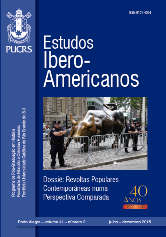Violence, global unrest and advanced capitalism: the case for the English riots of 2011
DOI:
https://doi.org/10.15448/1980-864X.2015.2.21302Keywords:
England, riots, protest politics, western democracy.Abstract
Over the last five years or so, we have witnessed increasing forms of violence and unrest across the world. In the media, these depictions of violence are presented as actions of resistance to oppressive regimes and corrupt politics yet are, at the same time, deliberately detached from a global politik which is collapsing in numerous ways: the manifestations evident in market instability, and increasing austerity, unemployment and marginalisation; a sign perhaps that the orgy of globalisation is reaching its climax. Some of this was reflected in what we saw across English cities in 2011. In this paper, I discuss these riots – why they might have happened and the State response – but perhaps more importantly how they should be reconsidered as part of other forms of violence and dissatisfaction against oppressive regimes and corrupt politics as a collective response to a global system on the brink of collapse – in Europe, the Middle East, or Latin America – as a result of its neverending pursuit of rampant profit at the expense of millions of people.
Downloads
References
ANGEL, H. Were the riots political? In: Safer Communities Special Edition on the riots, v. 11, p. 24-32, 2012.
BAUMAN, Z. Work, consumerism and the new poor. New York: Open University Press, 2005.
BENYON, J. Scarman and After: Essays reflecting on Lord Scarman’s Report , the riots and their aftermath. London: Pergamon Press, 1984.
BODY-GENDROT, S. Disorder in world cities: Comparing Britain and France. Cited online at <http://www.opendemocracy.net/ourkingdom/sophie-body-gendrot/disorder-in-world-cities-comparing-britainand-france?utm_source=feedblitz&utm_medium=FeedBlitzEmail&utm_content=201210&utm_campaign=Nightly_2011-08-16%2005:30>.
BRIGGS, D. The English Riots of 2011: A Summer of Discontent. Hampshire: Waterside Press, 2012a.
BRIGGS, S. Rurality and the riots: From the Panel to the Village Pub. In: Briggs , D. (Ed.). The English Riots of 2011: A Summer of Discontent. Hampshire: Waterside Press, 2012b. p. 303-325. Guardian and LSE. Reading the riots: Investigating England’s Summer of Disorder. London, 2011.
HALL, S.; WINLOW, S.; ANCRUM, C. Criminal Identities and Consumer Culture: Crime, Exclusion and the New Culture of Narcissism. Cullompton: Willan, 2008.
MORRELL, G.; SCOTT, S.; MCNEISH, D.; WEBSTER, S. The August riots in England: Understanding the involvement of young people. London: National Centre for Social Research, 2011.
MOXON, D. Consumer culture and the riots of 2011. In: Sociological Research Online, v. 16, 2011.
PEARSON, G. Hooligan: A history of respectable fears. 1983.
SOLOMOS, J. Race, rumours and riots: Past, present and future. In: Sociological Research Online, v. 16, 2011.
LEA, J. Shock horror: Rioters cause riots! Criminals cause crime. British Society of Criminology Newsletter, n. 69, Winter 2011.
SCARMAN, Lord. J. The Brixton Disorders, 10-12th April (1981). London: HMSO, 1981.
TREADWELL, J.; BRIGGS, D.; WINLOW, S.; HALL, S. Shopocalypse Now: Consumer Culture and the English Riots of 2011. In: British Journal of Criminology, v. 53, 2013.
VEBLEN, T. The theory of the leisure class. Harmondsworth: Penguin, 1994.
ŽIŽEK, S. Living in the End Times. London: Verso Books, 2011.
Downloads
Published
How to Cite
Issue
Section
License
Copyright
The submission of originals to Estudos Ibero-Americanos implies the transfer by the authors of the right for publication. Authors retain copyright and grant the journal right of first publication. If the authors wish to include the same data into another publication, they must cite Estudos Ibero-Americanos as the site of original publication.
Creative Commons License
Except where otherwise specified, material published in this journal is licensed under a Creative Commons Attribution 4.0 International license, which allows unrestricted use, distribution and reproduction in any medium, provided the original publication is correctly cited.






